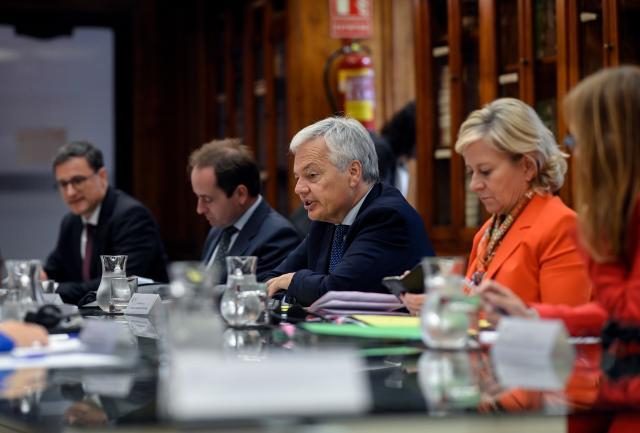
The European Commissioner for Justice, Didier Reynders, was in Madrid the last week of September, digging into the country’s stalemate in making necessary reappointments to the highest ranks of its judicial system.
The standoff is in its fourth year, with Spain set to take over the EU presidency in July 2023, a potentially embarrassing situation for the EU if the country’s judicial problem is not resolved by then.
While the EU Commission has threatened Hungary and Poland with heavy financial penalties for changes in their judiciary systems deemed to fall outside of the EU rule of law, it has so far only scolded Spain for its ‘irregular’ situation. During his visit, though, Reynders issued a gentle threat that the EU was losing patience and could take further disciplinary actions.
The Spanish controversy centres on renewing the General Council, the administrative arm of Spain’s judicial system, consisting of 20 members, 12 judges, and 8 other legal experts. The body holds judges accountable and appoints magistrates. Under Spanish law, the body’s membership is completely renewed every five years by the parliament. The appointments require a three-fifths majority approval in both the congress of deputies and the senate: a practice that forces the two major parties to reach an agreement.
No such agreement has transpired in years, though the General Council’s mandate expired in 2018. Both the governing socialist party, Partido Socialist Obrero Español (PSOE), and the centre-right Partido Popular (PP) recriminate the other for refusing to compromise on appointments. Now, four years into the political stand-off, both the practical functioning of Spain’s courts and the public perception of the justice system’s political neutrality are being negatively affected.
Reynders’ three-day visit included a meeting with the mixed commission for the European Union. In his address to the committee, Reynders reminded Spanish politicians that, so far, the EU has only warned Spain of its trespass against EU rule-of-law standards. There remains, Reynders threatened, harsher measures to come because “if now that we are applying sanctions to third parties” (a reference to Russian oligarchs), “we want to be credible abroad, we also have to be credible in the application of our own law.”
He also reiterated EU recommendations: renew the General Council immediately under the current system and then reform the appointment system so the General Council members are appointed by their peers—the country’s judges, not its politicians.
Though the EU ultimately wants Spain to change its method for appointing the General Council, it also realises that the immediate need is to get the country’s court system functioning again. Hence its calls for a two-step strategy. First, overcome the political impasse so the courts can fully function, and then change the law so that politics cannot directly affect courts in the future.
He added that this recommendation is not a whim of the Commission, but a “decision of the committee of ministers of the Council of Europe … of which Spain is a part.”
Reynders reminded the politicians that it is common in European countries for judges to be elected by other judges, and since 2016, a recommended practice by the Council of Europe.
Within the current Spanish judicial-political controversy, the Partido Popular proposed such a legislative change as well, but the PSOE rejected it, as it would be political suicide for the socialist-led government, supported by Catalan and Basque independentists. It is to Pedro Sánchez’s advantage to keep the appointment system as is and even the stalemate going, in order to retain the support of the separatists for his current weak government and any potential future government, as the country will hold general elections in 2023. He received independentist support for the 2020 investiture by promising to use his power to turn the courts towards independentists.
The Spanish courts have long had a conservative majority that has served as a firewall against validating the leftist drift of the independentists, so if judges appoint judges, that conservative leaning would likely remain.
So far, the courts have upheld the illegality of the referendum on Catalan independence carried out in the region in 2017. If however the courts are turned in PSOE’s favour, the fear is that the country’s nationalist-separatist movements could get judicial approval for a new referendum. According to El Debate, the members of PSOE on the mixed commission made it clear that their party would not support any change in the way the General Council is appointed.
Putting politicians’ opinions aside, in a round of meetings with judges, Reynders found that most are in favour of following the EU’s recommendations. They realise Spain’s present system for court appointments is no longer workable and has led to a dysfunctional and discredited judicial system.
The ABC reports that the representatives of the two majority associations representing the country’s judges, María Jesús del Barco and Jorge Fernández Vaquero, from the Professional Association of the Judiciary (APM) and Francisco de Vitoria (AJFV) respectively, conveyed their agreement with the EU to Reynders.
“If we want to prevent this from happening again, it is not enough to carry out the renovation, which only allows us to overcome this stage of stagnation, but we must open a stage of construction, build solid foundations for the judicial system that cannot be the ones we have now, which are already destroyed,” Fernández Vaquero said. “Let’s renew now for pure general interest and then seriously consider that the system must be reformed.”
Throughout Reynders’ visit, which included meetings with several government ministers, both the government and the PP continued to accuse the other of blocking the judicial appointments. When and how the political standoff will end remains to be seen, as well as how the EU will react should the Spanish government continue its current stance toward the EU’s recommendations.
